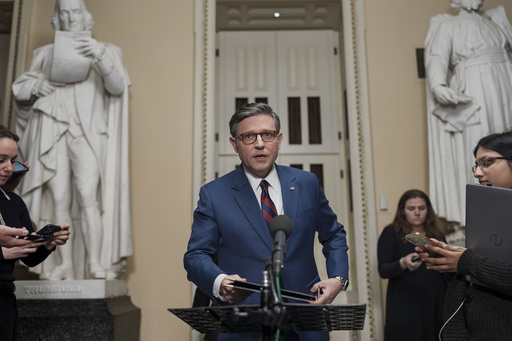
In the final hours leading up to a potential federal government shutdown, President-elect Donald Trump reiterated his call for a debt ceiling increase to be part of any funding agreement, declaring that closures should “start now” if his conditions aren’t met.
On Thursday, the House turned down Trump’s proposed plan intended to keep the government operational and halt the debt ceiling increase for the time being, as both Democratic and several Republican lawmakers opposed the last-minute stipulations.
House Majority Leader Steve Scalise, a Louisiana Republican, stated that discussions were still active among House Republicans regarding a new budget proposal. He emphasized their aim to bring a plan to the floor, whether through a formal rule or suspension, without providing in-depth details on the prospective incorporation of the debt ceiling into the discussions.
Scalise remarked on the necessity for a solid start for the incoming administration in January, implying that the success of their agenda hinges on efficient planning and execution.
During a closed-door meeting among House Republicans, efforts were focused on advancing a temporary funding measure as well as aiding disaster recovery and supporting farmers. Representative Matt Rosendale from Montana indicated that no final decisions had been made regarding the direction for moving forward.
Rep. Chip Roy, a member of the Freedom Caucus, who opposed the recent Trump-backed funding proposal, exited the meeting hurriedly, hinting at a rising level of tension among members.
White House press secretary Karine Jean-Pierre stressed that this issue does not fall solely on President Biden to resolve, alleging that Republicans need to address the crisis they’ve contributed to. She confirmed that Biden had engaged in discussions about the situation with Senate Majority Leader Chuck Schumer and House Minority Leader Hakeem Jeffries.
As the clock ticked closer to a potential government shutdown, House Republicans were exploring the possibility of separating previous proposals into distinct votes for government funding, disaster assistance, and agricultural support, while possibly deferring the debt ceiling debate to a later occasion.
Senate Majority Leader Chuck Schumer called upon House Speaker Mike Johnson to revert to a previously negotiated bipartisan funding agreement, arguing it was the most efficient approach to prevent a government shutdown. However, Johnson faced pressure from both Trump and hardline Republican members, complicating his path forward.
Trump remained firm on his stance, asserting that any funding solution must incorporate a debt ceiling increase, emphasizing that if a shutdown was forthcoming, it should commence immediately. His comments drew a sharp contrast to the views of some lawmakers who perceive shutdowns as politically damaging and detrimental to their constituents.
Hakeem Jeffries, the House Minority Leader, attributed the failure of funding efforts to Republican donors prioritizing economic advantages for the wealthy over essential funding for vital programs. He expressed concern that a prolonged shutdown could severely impact the economy and working-class Americans.
In the early morning hours preceding the shutdown, far-right representatives met with Speaker Johnson to share their critiques and seek a path forward amidst growing pressure. Notably, some voiced optimism regarding ongoing discussions, while others expressed skepticism about achieving a vote for any viable resolution.
Steven Bannon, a close ally of Trump, publicly criticized Speaker Johnson’s approach during a conservative event, suggesting he lacked the necessary qualities to lead effectively and urging for a change in leadership. He drew laughter from the audience, indicating strong dissatisfaction among some Republican factions regarding Johnson’s handling of the situation.
House Democrats reiterated their commitment to the original funding deal, dismissing the proposed changes as inadequate. Amid fierce negotiations, Republicans were seemingly struggling to clarify their strategy to advance a funding solution after a prior proposal backed by Trump was soundly defeated.
Vice President Kamala Harris announced she would be halting her travel plans to remain in Washington as the imminent threat of a government shutdown loomed.
Despite efforts to push a last-minute proposal through a chaotic voting process, a new plan from Trump fell short of the required support, resulting in the bill’s rejection and leaving House Speaker Johnson in a precarious position as he sought alternative solutions ahead of the midnight deadline.
